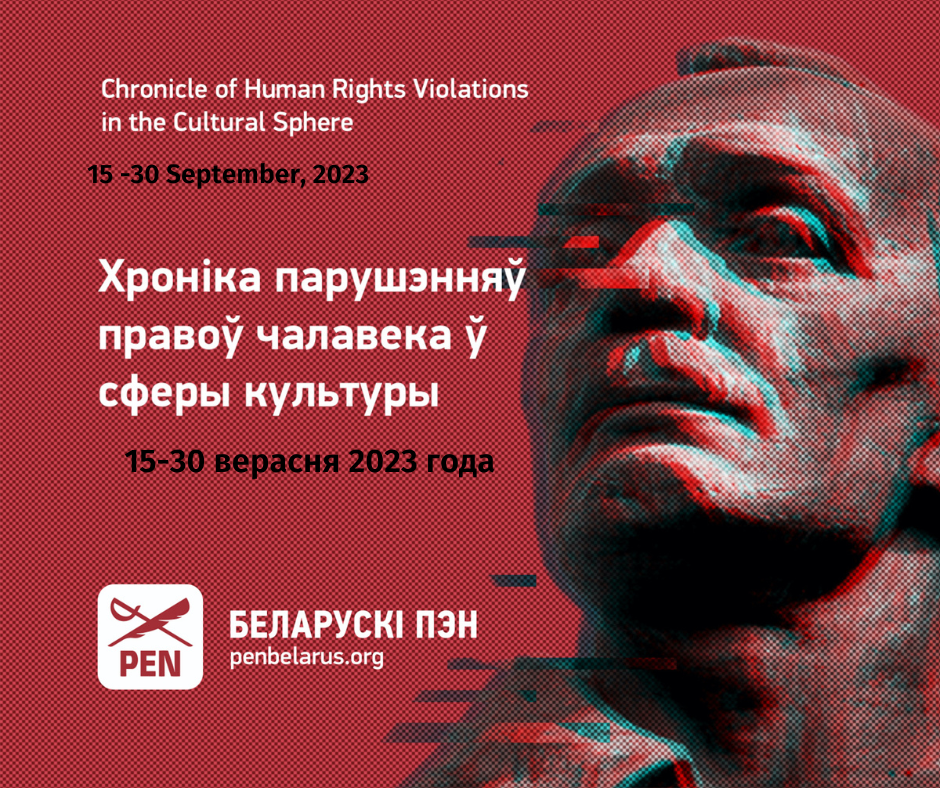
As of 30 September 2023, at least 127 cultural figures, including not less than 31 People of the Word, were behind bars.
The Viciebsk Regional Court issued verdicts in the criminal case against video operator Viačaslaŭ Lazaraŭ and his wife, a Russian language teacher, Tacciana Pyćko. Viačaslaŭ was sentenced to 5.5 years in a medium-security penal colony. Tacciana, the mother of three, received three years in a minimum-security penal colony.
The populariser of Belarusian culture, Larysa Ščyrakova, was added to the list of “persons involved in extremist activities.”
Musician Ruslan Rahoŭski from Hlybokaje was arrested for ten days.
The heads of 9 libraries received orders from the district prosecutor’s offices to remove nine books labelled as “extremist” from the catalogues.
In Bielaaziorsk, Brest region, authorities banned the literature and song festival “Indian Summer with Nina Maciaš.”
A memorial at the site of execution of the victims of Stalin’s repression was dismantled in Mahilioŭ.
I. Politically motivated criminal cases against cultural workers, authors and performers
1. On 22 September, the Ministry of Internal Affairs added the political prisoner, populariser of Belarusian culture and journalist Larysa Ščyrakova to the “List of Belarusian citizens, foreign citizens or stateless persons involved in extremist activities.” Larysa Ščyrakova was sentenced to three and a half years in a penal colony.
2. On 25 September, the Viciebsk Regional Court handed down behind closed doors a verdict in the criminal case against the family of video operator Viačaslaŭ Lazaraŭ and Russian language teacher and the mother of three underage children Tacciana Pyćko. Viačaslaŭ Lazaraŭ was sentenced to five and a half years in a medium-security penal colony. Tacciana Pyćko received three years in a minimum-security penal colony. The couple was accused of allegedly cooperating with the Belsat TV channel, labelled as “an extremist formation” in Belarus. Viačaslaŭ Lazaraŭ was convicted under Art. 361.4 (2) of the Criminal Code (facilitating extremist activity), Tacciana Pyćko – under Art. 361.4 (1) of the Criminal Code (setting up an extremist formation or participating).
3. On 28 September, the Homiel Regional Court started a new trial of journalist, historian, and populariser of Belarusian culture Jaŭhien Merkis behind closed doors. On 30 May 2023, the same court found Jaŭhien Merkis guilty under Art. 361.1 (3) of the Criminal Code (setting up an extremist formation or participating in it) and under Art. 361.4 (1) (2) of the Criminal Code (facilitating extremist activities) and sentenced him to four years in a medium-security penal colony. He was moved to the penal colony in Škloŭ.
II. Politically motivated administrative detentions and arrests of cultural workers, authors and performers
On 15 September, it became known that on 8 September 2023, the Hlybokaje district court ruled in the administrative case of musician Ruslan Rahoŭski. He was arrested for ten days under Art. 24.23 (1) of the Code of Administrative Offences for alleged “unauthorised picketing” – two photos with the Pursuit coat of arms and images of a white-red-white flag posted on the VKontakte social media platform.
III. Trials and arrests for using Belarusian and Ukrainian national symbols
1. On 6 September, the Sianno district court ruled to issue a 2,220 BYN ($880) fine for Viačaslaŭ Jachnaviecki under Art. 24.23 (1) of the Code of Administrative Offences for alleged “unauthorised picketing.” The “offence” was committed during the ID check when the man showed the police officers his passport with the Pursuit emblem on the cover.
2. On 6 September, the Rahačoŭ district court heard the administrative case against a resident of Lučyn. The man was accused of allegedly “unauthorised picketing” under Art. 24.23 of the Code of Administrative Offences. He received a 740 BYN ($225) fine for a white-red-white flag on the fence near his house.
3. On 11 September, the Dokšycy district court ruled to arrest Valery Jackoŭski for ten days under Art. 19.11 (2) of the Code of Administrative Offences for the alleged “spread of extremism” – placement of the Pursuit coat of arms and a white-red-white flag in the Odnoklassniki social media platform.
4. On 22 September, it became known about the detention of workers at the Mozyr refinery. On the phone of one of the detainees, police officers found a video of a festive dinner, with workers speaking in support of Ukraine: “Glory to Ukraine! Belarusians for their native, fraternal Ukraine! Glory to the heroes! Glory to Ukraine!”
IV. Conditions in places of detention, tortures of prisoners
The cultural figures behind bars continue to have restrictions in their correspondence. Only letters from close relatives reach political prisoners.
V. Destruction of memorials
On 25 September, it became known that the cross commemorating the victims of Stalin’s repression at the site of mass executions was dismantled during the reconstruction of Dimitrov Avenue in Mahilioŭ.
VI. Repressions in the book and publishing sector
On 25 September, the prosecutor’s office of the Minsk region discovered the books designated by courts as “extremist materials” in the electronic catalogues of central and rural libraries. The monitors found information on nine books recognised by the rulings of Minsk’s Central District Court as “extremist”. District prosecutors issued orders to the heads of nine libraries, demanding the removal of the books from the catalogues. The Prosecutor’s Office of the Minsk region has not revealed the titles of the books.
VII. Cancelations and bans of cultural events
On 19 September, it became known that in Belaaziorsk, Brest Region, the authorities banned the literary and song festival “Indian Summer with Nina Maciaš.” Organised since 2010, the festival always took place on 20 September, the birthday of Nina Maciaš, in Belaaziorsk’s House of Culture, bringing together writers, schools, libraries, and local authorities. Nina Maciaš (1943–2008) was a poet and translator from German, Polish and French, author of children’s books.
